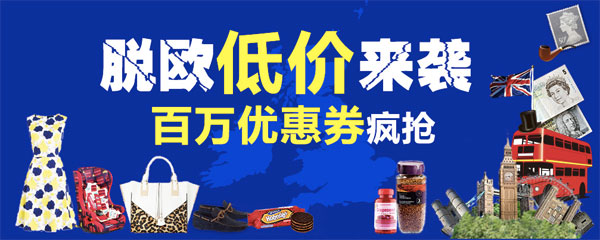 |
|
An advert on Alibaba's shopping website Tmall reads: Brexit low prices are coming, come grab vouchers worth one million yuan in total. [Photo/Screenshot from web] |
Online retailers in China launched Brexit-themed marketing campaigns in the wake of the UK's EU referendum, offering a slew of cut price deals on British and European goods as sterling continues to weaken, hitting a 31-year-low by Tuesday morning.
"Brexit low prices are coming, come grab vouchers worth one million yuan in total," reads the banner across Tmall's web page dedicated to UK goods. Slashing prices by as much as 60 percent, the Chinese online retail giant is advertising reduced "Brexit prices" on dozens of British products.
Tmall cut the price of McVitie's Hobnob biscuits, for example, by 39 percent, and marked down soft toys from London toymaker Jellycat by 8 percent. The retailer also lowered the price of some leather goods from the Cambridge Satchel Company by 40 percent. In a similar marketing campaign, Chinese online retailer Ozsp.com alluded to changing exchange rates as it offered consumers cut price European products.
Britain's vote to leave the EU immediately weakened the pound and wiped $2 trillion of world markets in 24 hours. On the morning of June 24, the day after the vote, the pound fell from a pre-referendum rate of $1.50 against the US dollar to $1.33. The currency briefly rallied last week, though on Tuesday morning it sank to $1.31 against the dollar — its lowest level since 1985.
The result of the EU referendum and its effect on exchange rates could be a boost for some companies, according to Chinese online retail giant JD.com.
"Brexit has been a challenging event for Britain, but the increased importance of the UK-China trading relationship offers somewhat of a silver lining for British brands," a company spokesperson told China Daily.
Last Friday, Bank of America's wealth management division Merrill Lynch upgraded Burberry to a "buy" rating, forecasting the British luxury fashion house's annual profit will increase by £97 million. Bargain hunters can now buy the company's sought after trench coats, for example, for around 10 percent less.
With online retail sites like Tmall launching cross-border sites, Chinese internet consumers can now buy directly from foreign retailers. Reaching $630 billion of sales in 2015, China's online retail market is far and away the world's largest, and according to consultancy firm McKinsey, cross-border consumer e-commerce reached $40 billion last year and is growing at 50 percent annually.
Quality imported goods from the UK are increasingly popular among Chinese online shoppers.
Royal Mail says China is now the biggest overseas consumer of British products online, accounting for 25 per cent of overseas online shoppers purchasing goods from the UK.
In 2015, the British postal service company entered into China's e-commerce boom by partnering with Alibaba's Tmall Global e-marketplace, offering China's approximately 300 million online shoppers access to British products.
McKinsey reports that rising disposable income and a desire to avoid locally available counterfeit goods are among the main drivers in China's booming e-commerce cross-border market.
The firm says that despite lower average income, consumers in small and mid-sized cities spend almost as much online as those in larger cities, and that apparel, recreation and education goods, and household products are the three dominant online retail segments.
Contact the reporter on [email protected]